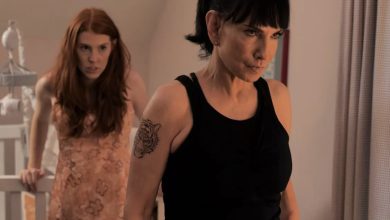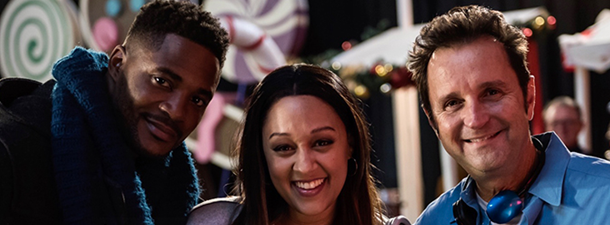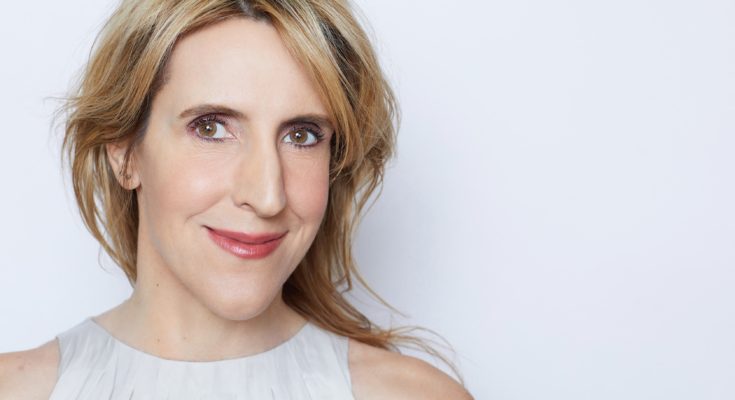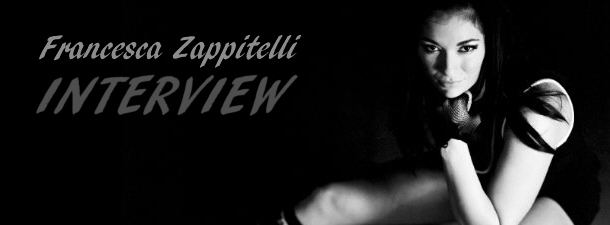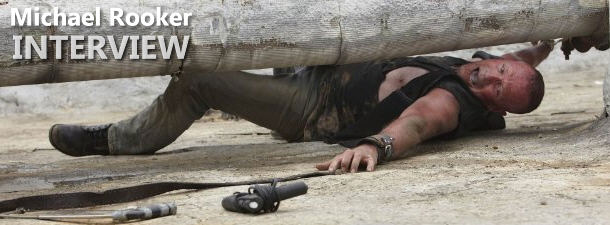Interview with co-directors of “The Nursery” Christopher A. Micklos and Jay Sapiro
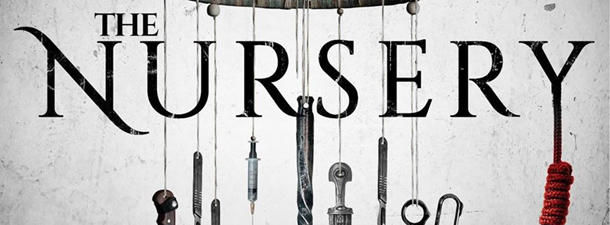
Christopher A. Micklos and Jay Sapiro are two directors who recently teamed up to create “The Nursery” which is a spooky horror piece about a babysitter that finds herself haunted by ghosts from her past. The film is due for release in June from Uncork’d Entertainment. Recently, both men discussed the work and their hopes for the future.
Meagan Meehan (MM) of Movie Vine: What inspired you both to direct?
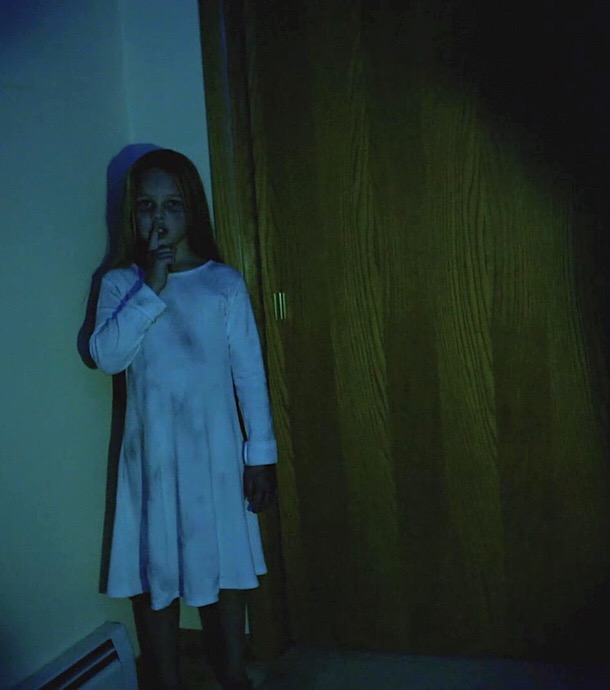 Jay Sapiro (JS): Producing and directing is what I went to school for, and it’s what I’ve done all my professional life. That’s not separate from Chris, though, as we went to college together and we’ve been business partners for 20 years…along with our third business partner and fellow filmmaker / executive producer, Glenn Chung. And as anyone who knows us will tell you, Chris and I share a brain. We think alike, work extremely well together, and balance each other out when it comes to this type of work. So, directing together was really an easy and obvious choice.
Jay Sapiro (JS): Producing and directing is what I went to school for, and it’s what I’ve done all my professional life. That’s not separate from Chris, though, as we went to college together and we’ve been business partners for 20 years…along with our third business partner and fellow filmmaker / executive producer, Glenn Chung. And as anyone who knows us will tell you, Chris and I share a brain. We think alike, work extremely well together, and balance each other out when it comes to this type of work. So, directing together was really an easy and obvious choice.
Christopher A. Micklos (CM): That’s true. And if Jay will hand me our brain for a second, I’ll add my two cents. Like Jay, this really has been a lifelong ambition for me. I’ve been a writer one way or another all my life, with dreams of writing movies and being a part of the movie business. And in many ways, directing is a natural extension of that, wanting to see how close you can come to finishing what you start with a story or a screenplay and fulfilling your original vision. With The Nursery, we weren’t really thinking in those terms to start, though. At first, it was just the three of us deciding that we were going to take the big leap and make a movie together…and then we sort of figured we’d work out roles as the process unfolded. Then, the three of us worked out the core concept together and then spent lots of working sessions teasing out the key story elements that would become our treatment. And then I went off and wrote the screenplay. And then, at that point, with this being our first film and that screenplay feeling very much like a first-born child, you sort of just want to raise it and see it through. And, as Jay said, when we talked about how we’d move forward with production, both Jay and I indicated that we were interested in directing—and Glenn not so much—so we made the decision to co-direct. And it really was the natural, obvious choice, as he said.
MM: And was it always genre films you were primarily interested in?
JS: I can’t say that I’ve always been primarily interested in genre films. I enjoy and draw inspiration from all kinds of movies. Though I do know someone who is pretty focused on horror films, and his name is Chris Micklos.
CM: It’s true. While we’re all big movie buffs, in general, I have been a horror fan since I was a kid…so making a horror movie, specifically, was what I very, very much wanted to do. I grew up, really, on the genre classics: The Universal monsters, and the 50’s sci-fi giant insect movies and all those. I read all the classic monster picture books and fan mags. Heck, to this day I still collect classic horror memorabilia, primarily from that period because I have so much affection for it. And then, as I got older, I got more interested in the theory and philosophy of horror, especially cinematic horror, and so I dove into stuff by Noel Carrol and Robin Wood and their contemporaries…and stuff like Stephen King’s Danse Macabre…and I just ate that stuff up. Then I finally put on my big boy pants and got more into contemporary horror and the modern stuff that still affects me to this day. Usually, around Halloween time, John Carpenter’s original Halloween makes its way to a local theater for a night or two, and I try to go see it on the big screen and with an audience whenever I can. And every time I’m like a kid in a candy shop, because I love it so much. And it still affects me in a very primal way. So, yes, horror is my first love, so to be able be a part now of the sort of oeuvre of cinematic horror is really a dream come true.
MM: I imagine genre films are easier to make but also sell? Or is that a myth?
CM: Well, at this point, it’s all we know, so that’s a somewhat difficult question to answer. I can say that I do think that genre fans in general—and that would include sci-fi fans and fantasy movie fans, for sure, but definitely horror fans specifically—are a special breed of movie fan. They—or, actually, “we”, because I count myself enthusiastically as a horror fan—are unlike any other moviegoer out there. I think horror fans can be both very forgiving and very demanding of a film. We are willing to put up with a lot: gaps in logic, cheesy effects, bad lighting, bad acting. I mentioned Halloween earlier, which I think is a simply brilliant horror film—nearly perfect—but by and large the acting is borderline abysmal. So, we’re willing to put up with all this, but—BUT—you have to give us something, right? Scare us. Surprise us. Show us something we haven’t seen before. Entertain us. Give us something! And then we’ll go along with you on the ride. And I also think, frankly, that genre fans—and specifically horror fans—just want you to be sincere. They want to know, or feel, that you give a shit about the genre and you take it seriously…even if your film isn’t particularly serious. Camp is fine, as long as it comes from a place of sincerity and appreciation. But no matter where you’re coming from—something campy and audacious like Evil Dead 2 or Re-Animator or something very straight-forward and unrelenting like the original The Strangers or even something fun and satirical like What We Do in the Shadows—as long as it’s sincere and shows respect and appreciation for the genre, horror fans will largely come on board. And I certainly hope that our respect and appreciation for the genre and its fans comes through in The Nursery.
 JS: They can be easier to make and sell, just generally speaking, but I guess it really comes down to how you approach things as a filmmaker. When it comes to producing a horror movie, if you stay in your lane, and keep focused on what you’re trying to accomplish, you certainly can mitigate against it becoming an overly daunting endeavor. The three of us knew that we were working with a micro budget for The Nursery; therefore, we were vigilant we it came to pre-production and making sure that we weren’t going to overspend when we moved into production and post-production work. That kept us very organized…and made this film a bit easier to produce than others. Or so we’ve heard from other filmmakers. I can’t say that that’s the case for everyone, but that certainly was our experience. As far as selling the film goes, we also put a good amount of time and energy into doing all we could do – or at least what we thought we could do – to get distributors to notice The Nursery. Shortly after we completed the post-production process, we created a trailer and a press kit. We placed that material, along with our finished film, on a site where distribution companies can shop around to see what’s available. Not wanting to just wait and see, we—Chris, really—wrote to scores of distributors to encourage them to check out The Nursery online. Something worked because we had about a dozen offers from distribution firms. Ultimately, we chose Uncork’d Entertainment due to their fantastic reputation as well as their vision for getting The Nursery out to the masses.
JS: They can be easier to make and sell, just generally speaking, but I guess it really comes down to how you approach things as a filmmaker. When it comes to producing a horror movie, if you stay in your lane, and keep focused on what you’re trying to accomplish, you certainly can mitigate against it becoming an overly daunting endeavor. The three of us knew that we were working with a micro budget for The Nursery; therefore, we were vigilant we it came to pre-production and making sure that we weren’t going to overspend when we moved into production and post-production work. That kept us very organized…and made this film a bit easier to produce than others. Or so we’ve heard from other filmmakers. I can’t say that that’s the case for everyone, but that certainly was our experience. As far as selling the film goes, we also put a good amount of time and energy into doing all we could do – or at least what we thought we could do – to get distributors to notice The Nursery. Shortly after we completed the post-production process, we created a trailer and a press kit. We placed that material, along with our finished film, on a site where distribution companies can shop around to see what’s available. Not wanting to just wait and see, we—Chris, really—wrote to scores of distributors to encourage them to check out The Nursery online. Something worked because we had about a dozen offers from distribution firms. Ultimately, we chose Uncork’d Entertainment due to their fantastic reputation as well as their vision for getting The Nursery out to the masses.
MM: In terms of The Nursery, what was involved before you even rolled an inch of film?
CM: A ton, really. A ton of work. And since he did most of it, I’ll let Jay take this one himself.
JS: It really was an enormous amount of planning! Our background producing ads and videos prepared us a bit, but I don’t know if any of us knew just how much time it would take to coordinate everything on our own. It probably would have been a lot easier if we had a bigger crew and could have delegated some of the responsibilities to others, but it really was just the three of us doing all the detail work and coordination. Besides casting the film and finding the perfect locations, we had to assemble the best crew possible. That wasn’t too difficult, though. We’ve worked with many talented film and video professional over the years. Selecting Daniel Andera as our DP wasn’t a hard choice at all. He’s outstanding, and we’ve known him for a long time. The rest of the crew, including our ace sound guy, Jacob Fatke, fell into place after we put our heads together with Daniel. Making sure we had all the right equipment—we used a mix of our own equipment, some of Daniel’s, and rented a few things—and getting everything lined up before the shoot was a bit daunting. One of the really huge hurdles, though, was scheduling the production. Chris and I spent many days going through each scene in the script to figure out exactly how to schedule the shoot. We had to consider the availability of the crew, our stylist/practical effects team, the talent, and the location…not to mention what would work best from a creative point of view. Add into the mix that some people were travelling to our primary Milwaukee location from Madison, and you can imagine how challenging it was to schedule the production. A big concern we had was that a scene or shot would, somehow, slip through the cracks. Happy to report that we got everything we needed and that the planning was well worth it. If folks are really interested in hearing about all that went into creating The Nursery, we cover our pre-production work and much more in our podcast called “Indie Horror Rising: The Nursery” which can be found on iTunes or Soundcloud.
CM: The only thing I’ll add is to piggyback on something Jay said. To this day, when someone asks us what we’re most proud of, we both generally say that it’s the fact that we didn’t forget to shoot anything! We were convinced that we’d get to the edit and be, like, “Wait, did YOU shoot that one scene?” “No, I didn’t shoot it. Didn’t you?” Oops. But like Jay said: to our shock during post-production, everything was there just as it should have been!
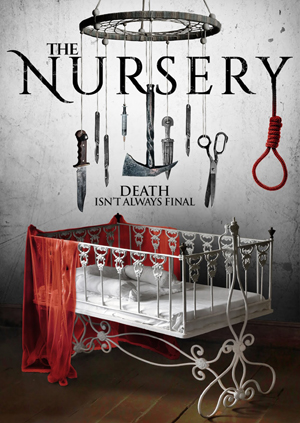 MM: What was it about eerie nurseries that interested you?
MM: What was it about eerie nurseries that interested you?
JS: There’s just something about kids/babies in horror flicks. I’m sure that everyone reading this can tick off a half-dozen of those types of films without breaking a sweat. When it’s done right, it can be quite effective. I will say that we really got excited about the possibilities when we started thinking about the monitors/cameras that folks use to keep an eye on their kids. I don’t want to give anything away, but we were able to get pretty creative with what is seen on that type of screen in The Nursery.
CM: Yeah, there are a couple of things at play here that I think make it a great setting to center a film around. First off, when we started the process of making The Nursery, I was a relatively new father, and so I was spending a lot of time in our nursery, especially late at night as my wife and I would alternate who got up every couple of hours to change and feed our little girl. And so, you’re sitting there in the near darkness, maybe some blue-ish light from the nightlight or whatever, with this tinkling music softly playing…and it’s all very serene and sweet, but there’s also something that makes it feel that it could quickly go creepy and sinister on you! Add to that that a baby in its crib in a nursery is about the most pure, innocent—and not to mention vulnerable—thing that you can possibly imagine…and the juxtaposition against something dangerous and corrupt and unnatural is amazingly ripe for horror. So, you take that and then add in the long, rich tradition of kids in horror movies and horror literature and on and on, and it becomes something very compelling to explore. Of course, there are stories in which the kids are something to be feared, like Children of the Corn or The Omen or something more outrageous like It’s Alive!. And then the stories where the kids are in the more vulnerable or victim role: think the little girl drown by the monster in Frankenstein or the kids from It or Stranger Things, right? Or the little crying baby that Dracula feeds to his starving brides in Bram Stoker’s Dracula. That’s such a powerful, horrible moment! Putting kids or babies into these stories, one way or another, really amps up the stakes and creates an entirely different dimension of tension and suspense, and that’s some of what we were trying to tap into with The Nursery.
MM: How important is production design on a movie like this?
JS: Production design was extremely important. And key to that is the location. We really lucked out as we ended up with the perfect location for the film. Besides a few shots around the University of Wisconsin campus at the beginning of the movie, the film takes place at a house in the Milwaukee area. Overall, the home had a Frank Lloyd Wright vibe. The main level had great wood tones, a large grand piano, and wonderful shag carpeting. And the downstairs had a very cool bar area with retro wood paneling and low ceilings. All that was terrific, but the best room in the house was the basement storage room. Boxes upon boxes were stacked with old clothing, furniture, electronics…you name it and it was in that storage room. As folks will see when they watch the movie, we used that wonderfully claustrophobic setting to our advantage as filmmakers.
CM: Yes, we really, really got lucky with our location. In a micro-budget film like ours, you really have to pick your spots in terms of where you dedicate your time and resources. So, we were extremely lucky that the house where most of the film takes place was almost good-to-go as it was. We moved a few things around and moved some artwork around and such, but by and large we shot it as we found it. That said, though, what we found was the perfect setting for the movie we were trying to make. Not the least of which was that overstuffed, labyrinth of a basement storage room Jay talked about, which is where some of the most frightening stuff in the movie takes place! We could never have designed and created a set that was as creepy, as claustrophobic, or as suggestive of ill portent as that back basement was. It’s practically something out of an Edgar Allen Poe story, for God’s sake! But all of that—the whole house—was natural production design that we were able to take advantage of and leverage to great effect in creating the atmosphere and vibe of The Nursery.
MM: And I imagine sound is just as important?
JS: I can’t place enough emphasis on sound. Many micro and low budget films seem to take shortcuts when it comes to audio, and that’s a huge mistake. Going that route was never on our radar. In fact, we were just the opposite: we knew that audio would play a big part in the success or failure of the film. So, we made audio a big priority. I think we made the right choice there because we consistently heard from distributors that our audio was excellent and it helped make The Nursery stand out. We give Jacob Fatke a lot of credit for that. He made sure all the actors were mic’d properly and that the sound on location was flawless. When we moved in post-production, Audrey Martinovich from Audio for the Arts was our partner. Audrey worked her magic with the dialogue and did an amazing job with the original score for the film. As she likes to tell people, the score is centered on Db, Eb, and Bb, usually in this order: D-E-A-D and ending in Bb. I love that! And then, of course, original songs—two by Aby Wolfe, and two by The Softrocks—added depth to the audio in the film in ways you need to hear for yourself to appreciate.
CM: Since Jay and I share that brain and all, he pretty much hit everything I would say, as well. I will just ditto that the original songs that we were lucky enough to get permission to use make a big, big difference in a way that we weren’t anticipating. Aby Wolf’s “Potion Jar”, which plays over the opening credits, really sets the tone for the film to come, and then Aby’s “Disassembled”, which plays over the closing credits, works to send the audience off into the night with this somber, melancholy serenade that really punctuates the ending of the film.
MM: What was the intention with the movie? Make some money? Further your careers? Get immediate seating at a favorite restaurant?
CM: As corny as it sounds, the journey really was the thing…for me, at least. Ever since I was a kid, I wanted to make a movie. I went to college and studied Radio/TV/Film—where I first met Jay, incidentally—and after that I intended to study filmmaking in graduate school. But then your interests change and you start to get interested and excited about other things, and life just sort of happens. But even when we—Jay, Glenn, and I—were building our media and consulting business and finding a good deal of success, we all had it in the back of our minds that someday we would still make a movie. Just for the fun of it! Then, when we sat down about two years ago and started talking seriously about it, I think we all just sort of came to the conclusion of “If not now, when?” We can talk about it. We can plan it. We can wait for the perfect time. But there is no perfect time. You just have to take the plunge and go for it. So, right from the start, the whole idea and motivation, at least from my perspective, was to actually do this thing that I’ve wanted to do all my life. To be a part of this genre and business that I’ve always loved. And at each stage of the process, it was all about just enjoying and treasuring what we were doing…which, even as much as filmmaking has changed in recent years and it has become a more accessible thing to do, it is still something that not that many people do. So, it was all about just doing it and taking pride in doing this big, unique thing. And, of course, at some point you start to think about how cool it would be if you get distribution or find some other way to get it in front of a wider audience, and you think about the possibility of making some money and maybe making a second career out of it. But all that stuff is really secondary to just the joy and sense of accomplishment of just doing it…and doing it in a way that you can really be proud of. And that’s what we did!
JS: Glenn, Chris and I have been talking about making a feature length film for years. We had a couple of starts on other movies, but nothing really materialized. At one point a couple of years ago, we simply agreed that it was time to make it happen. After that, things just clicked for us. I think it’s fair to say that we’ve loved every minute of it so far. I say “so far” because we’re still going through the process. The Nursery is scheduled for release in June, with pre-order on iTunes happening now.
MM: Thus far, what has been the best part of working in the filmmaking industry?
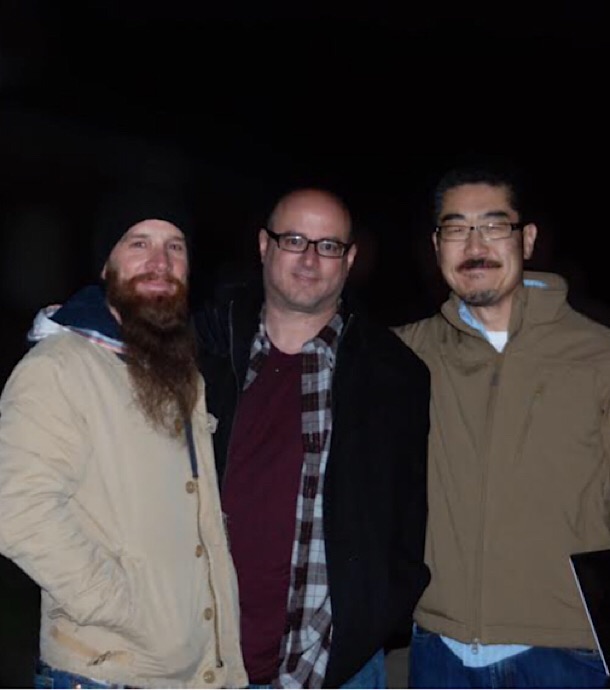 JS: That’s a tough one as we’re still on the journey. I’ll say, though, that it has been one of the highlights of my life. I loved being on set and working with the cast and crew; that was amazing. I also thoroughly enjoyed editing the movie. Putting it all together as the editor, and seeing our original story take shape right before my eyes was really was surreal. I have to say that working with Keith Leopard at Uncork’d Entertainment has been terrific too. You hear a lot of horror stories—and not the good kind!—about distributors. We were very fortunate to end up with Keith and his talented crew.
JS: That’s a tough one as we’re still on the journey. I’ll say, though, that it has been one of the highlights of my life. I loved being on set and working with the cast and crew; that was amazing. I also thoroughly enjoyed editing the movie. Putting it all together as the editor, and seeing our original story take shape right before my eyes was really was surreal. I have to say that working with Keith Leopard at Uncork’d Entertainment has been terrific too. You hear a lot of horror stories—and not the good kind!—about distributors. We were very fortunate to end up with Keith and his talented crew.
CM: That’s a really great question, actually. I would concur with everything that Jay said, really, because there are so many highs along the way and so many things that are really cool…but personally I would narrow it down to two things. First, those days we spent in actual production were some of the best days of my life. We shot The Nursery in thirteen days over the course of about six weeks, and those thirteen days were just absolutely incredible. Stressful, yes. Tense, yes. Full of doubt and uncertainty and all that, sure. But despite all that, they were fun and exhilarating and—again, at the risk of sounding corny—just magical. Every day on set or on location, it was like: “We are REALLY doing this!” It was just the best. And I’d come home at night usually at like 2:00 a.m. after driving an hour and a half from where we were shooting, and I’d just lay in bad all jacked up and wide awake, just replaying it over and over in my head…all before having to get up at 7:00 a.m. or so the next day to get started again. So, definitely that. Definitely the actual production process. In addition to that, though, I’d say that the first time seeing it on a big screen with a live audience was pretty cool. We had a friends and family screening at a theater on the University of Wisconsin campus here in Madison, where we live, and the theater’s capacity is about 300 plus, which we nearly filled. And seeing The Nursery projected up on the big screen and hearing our sound come booming out of the speakers…and then watching the crowd for reactions and responses throughout the film…that was the absolute best. Nerve-wracking, for sure! But it was so cool to have the moment of confirmation, like, this is real. We made a real movie!
MM: Career wise, where do you see yourself in ten years?
JS: Glenn, Chris and I started a film production company called Three Tortured Minds. So, in ten years, I see us looking back on all the movies we’ve created together!
CM: Absolutely. In ten years, I think that we hope to be in a place where we’re making movies regularly, where we’ve moved on from micro-budget and have some more resources to do some more robust productions…and hopefully where was have an established reputation and audience in the genre. If Three Tortured Minds can have a four to five film library established in the next ten years, that would be awesome. That probably doesn’t sound like an incredibly sexy dream. We’re probably supposed to be talking about multi-million-dollar hits and blockbuster films and awards and accolades and all that! But to be in a place where I can just be writing scripts and making the occasional film and getting them out to an audience with some regularity, that would be plenty, plenty enough for me. Oh, that and getting immediate seating at my favorite restaurant, of course.
MM: Do you have any upcoming projects that you would like to mention?
JS: The three of us are in pre-production on another film. It’s horror/suspense, and I think the concept is a great one. We hope to be in production yet this summer and then get it into post!
CM: Yes, and beyond that, I’d just mention that for film enthusiasts and aspiring filmmakers, we have a podcast that Jay mentioned earlier called “Indie Horror Rising”, which people can find anywhere they get their podcasts. And they can find us on Facebook at facebook.com/indiehorrorrising. For the past several months, we’ve been doing weekly episodes focused on the making of The Nursery…each episode tackling a different element of the filmmaking process: scripting, pre-production, financing, etc. We also try to talk, when we can, to other indie horror filmmakers, people who work in the media, etc., to give different perspectives and advice. And we’ll likely be doing a lot more of that—focusing on guests and interviews with filmmakers, distributors, etc.—moving forward.
MM: What advice would you give to someone who is aspiring to enter the industry, especially as a filmmaker?
JS: Do your homework. It’s not the sexy part of filmmaking but being prepared before you jump in makes all the difference in the world. And if your goal is for your film to be picked up by a distributor, poke around online to see what’s required at that stage of the game…copyright clearance, releases from crew, talent, musicians, etc. Knowing about that ahead of time will make your life a lot easier when you try to get your film to market. Oh, and have fun too!
CM: That’s another great question. For sure everything Jay said, because that’s all really important. But even more fundamentally, to aspiring filmmakers I would just say: go for it! Again, not to be cliché, but if we can do it, so can you. If you want to make a movie, make a movie. If you want to be a writer, write. If you want to be a filmmaker, be a filmmaker. Just decide you’re going to do it, and then figure it out as you go. Self-doubt and self-imposed obstacles are killers, but if you decide to get past them, you can. When I was ten years out of film school and working in politics and media and fantasized about making a movie, I always thought, “Nah, it’s too late for me.” Ten years after that, it was definitely too late, right? But it wasn’t. It’s never too late or the wrong time to make a run at your dreams. There’s no magic involved and there’s no voodoo involved. It’s all about hard work and just going for it. We did it. And if we did it, so can you.
* * * * *
To learn more, visit their official Facebook page, website, Instagram, and Twitter. Chris can also be followed via @chrismicklos
